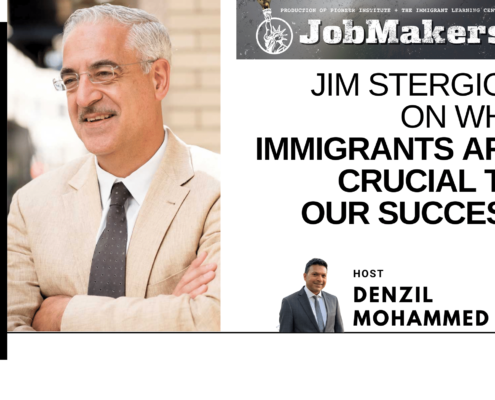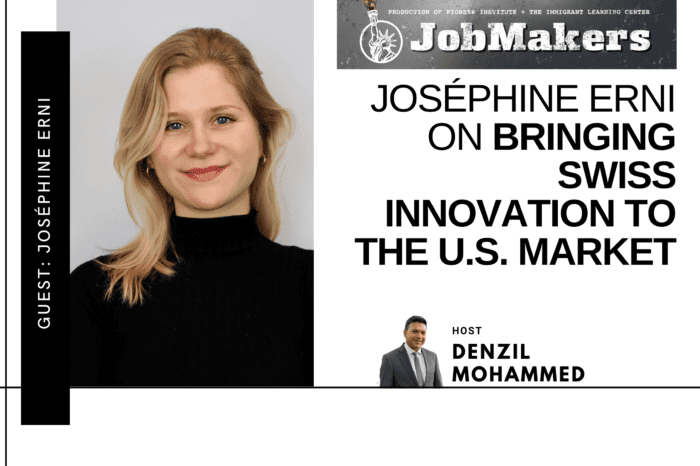Joséphine Erni on Bringing Swiss Innovation to the U.S. Market
/in Economic Opportunity, Featured, JobMakers /by Editorial Staff
This week on JobMakers, host Denzil Mohammed talks with Joséphine Erni, Innovation Lead at Swissnex in Boston and New York, and immigrant from Switzerland. She explains how building collaborations between the highly entrepreneurial Swiss and the world’s biggest market, the U.S., gives rise to incredible innovations that benefit the world. She shares how Swissnex, the world’s first “science consulate,” has connected these two parts of the world in innovation, entrepreneurship, academia and the arts since 2000, as well as how they go about fostering collaborative ideas, research and businesses that mutually benefit both countries. She also emphasizes why being open to diversity brings creative solutions, as you’ll hear in this week’s JobMakers podcast.
Guest:
 Joséphine Erni is Swissnex’s Innovation Lead, where she develops and executes various startup and entrepreneurship programs. Before joining Swissnex, Josephine worked at the Swiss Business Hub USA, helping Swiss startups enter the US market. Josephine holds a BA in Business and Economics from the University of Basel and an MSc in International Economics from Vrije Universiteit Amsterdam. In her free time, Josephine enjoys exploring New York and picking up new hobbies such as sailing and painting.
Joséphine Erni is Swissnex’s Innovation Lead, where she develops and executes various startup and entrepreneurship programs. Before joining Swissnex, Josephine worked at the Swiss Business Hub USA, helping Swiss startups enter the US market. Josephine holds a BA in Business and Economics from the University of Basel and an MSc in International Economics from Vrije Universiteit Amsterdam. In her free time, Josephine enjoys exploring New York and picking up new hobbies such as sailing and painting.
Get new episodes of JobMakers in your inbox!
Read a Transcript of This Episode
Please excuse typos.
Denzil Mohammed:
I’m Denzil Mohammed. Welcome to JobMakers.
Denzil Mohammed:
Last time we heard from Dr. Joshua Bedi on how immigrants are just entrepreneurial themselves, but how they also encourage native entrepreneurship. So just imagine what can happen when immigrants and the US born collaborate together on new ideas and businesses. You get, for one example, America’s second Covid vaccine for Josephine Erni Innovation lead at SwissNex of Boston and New York and immigrant from Switzerland. Building those collaborations between the highly entrepreneurial Swiss and the world’s biggest market, the US gives rise to incredible innovations that benefit the world. She shares how Swiss snacks, the world’s first science consulate has connected these two parts of the world in innovation, entrepreneurship, academia, and the arts since 2000. As well as how they go about fostering collaborative ideas, research and businesses that mutually benefit both countries. Josephine emphasizes by being open to diversity, brings creative solutions as you hear in this week’s JobMakers podcast, Josephine Erni innovation lead at SwissNex in Boston and New York, the World’s first science consulate. Welcome to the JobMakers podcast. How are you?
Josephine Erni:
Thank you. Thank you for having me. I’m doing very well.
Denzil Mohammed:
So I said that this is the world’s first science consulate, so it’s not issuing visas or anything like that. It is fostering innovation and entrepreneurship between Switzerland and the us. Tell me a little bit more about what Swissnex is.
Josephine Erni:
Yeah, sure. So as you already mentioned it Swissnex is part of the Swiss government. And we connect Switzerland and north America and the world for, for that matter in science, education, innovation at the arts. As you said, we were founded in 2000 as a World’s, world’s first Science consulate laying the foundation for what would become the global Swiss Next Network. And today our team is distributed between the Cambridge location in Greater Boston as well as Stumble in Brooklyn, where we also have an office. And the, the main vision of Swissnex is really to help unlock the new generation of ideas for Switzerland and the world of tomorrow. So it’s really focused on creating those collaboration opportunities and making those connections between Switzerland and the rest of the world.
Denzil Mohammed:
And you say the rest of the world because your have offices in Brazil, in India, in China.
Josephine Erni:
Yes, exactly. Yeah. So it, it did start in Boston. It’s the first first office. From there it expanded throughout the US we have three locations, Boston, New York, and San Francisco. But then we also have locations around the world. The latest edition is in Osaka, Japan. We also have one South Korea Brazil, London and we do have science counselors that are a part of the Swiss embassies abroad as well that are part of the Swissnex network. So it’s, it’s definitely a very big network and has grown a lot over the past 22 years, which is really cool to see.
Denzil Mohammed:
And you used the word collaboration, and I want to stay on that for a little bit. One of the purposes of this podcast is to show that foreign born and, and us one talent together create incredible ideas. And the first thing that again comes to mind is Moderna. It has both immigrant founders and US founders. Tell me a little bit more about the idea of collaborating between Switzerland and North America and what has been the result of the, of those kinds of collaborations.
Josephine Erni:
Yeah, definitely. Maybe just, you know, also to take it back, I think Switzerland is really founded on collaboration, not just between Swiss people, but also internationally. You know, a lot of the, the success is really attributed to people who have come to Switzerland from abroad and really like, been able to bring their knowledge you know, for example, the H nots, you know, have to flee France and came into Switzerland and brought a lot of their expertise, which in turn then created a lot of innovation that we have in Switzerland. So I think that’s one aspect to consider that it’s always been part of Swiss Swiss innovation. And, you know, it’s, it’s now we are one of the, the most innovative countries in the world as a result. And I think that’s really great to see. You know, another example is also Basel, for example, with the chemical industry, as you mentioned as well, Moderna. There’s a lot of collaboration that would not be possible if it were just, you know, for Switzerland itself. So I think the, the collaboration part is really what makes Switzerland a competitive economy as well, but also helps other countries advance their technologies. And I think that’s really been the, you know, the, the best thing about it has always emphasized that’s collaboration and openness in regards to innovation. And I think that’s really been been the key success factor.
Denzil Mohammed:
So let’s bring it, bring it into New York and Boston. What kind of programming do you do and how’s it been going so far?
Josephine Erni:
Yeah, so we have a lot of different programs that we do at Swiss Next. So we do focus, as I mentioned, on academia research, research and innovation as well as arts. And we do have programs in all these different areas. Academia, for example, we partner a lot with universities from Switzerland and the us. And we do, you know, for example, exchange programs that we help you know, establish. Then we have a lot of like innovation boot camps, for example. And then regarding arts, we also do a lot of, of things on the kind of cross between, you know, innovation and arts, because that’s quite interesting as well. And then the area that I’m focused on is innovation. And there we have a lot of entrepreneurship programs that we develop. And that’s also my role specifically is just developing these entrepreneurship programs.
Josephine Erni:
And in that area, what we do is we run these startup programs for Swiss startups to explore and potentially enter the US markets. We have these twice a year where we kick it off with a bootcamp where startups kind of learn more about the US markets, what are the differences, what are the legal aspects to consider you know, how does funding work in the us. And then also just generally learning more about the US business mentality because it is quite different to Switzerland. And I think that’s one point where Swissnex is really strong in, in trying to convey these differences. And I think that’s also a reason why we exist in the first place, is to kind of bridge those gaps, right? Because even, even though you might think us and Switzerland are quite similar, there are a lot of differences.
Josephine Erni:
And so as people tend to be very modest and very, you know, shy about their technologies and their innovation, so it’s really on us to kind of, you know, convey that you have to be a bit more out there in the US market. So that’s always interesting. But yeah, that’s, that’s part of the bootcamps that we have. And then as part of those, the startups get to come to the US in person and they get to explore, you know, the markets and experience it in person. They get to meet with relevant stakeholders here, and we really try to make those connections. And yeah, it’s been, it’s been really great so far. It’s very rewarding to see, you know, the efforts that you put in as, as an organizer of these programs. And as I mentioned as well, we had the Sustainable Cities Lab that we just finished which is a special program that we launched this year that is really focusing mainly on urban sustainability, which is obviously a huge topic generally in the world, I would say. But especially in cities. And, you know, New York has done a lot to decarbonize the city’s and is looking to to do more. So it’s super interesting to be able to kind of bring those technologies from Switzerland to the us but also just encourage the, the exchange on these topics.
Denzil Mohammed:
I’m picturing the modest Swiss at a pitch fest selling his ideas in front of loud Americans. I dunno how well that will work, but yeah, it is, it’s vastly different to the us. And of course the US is the biggest market. What is the benefit to the US of the work that you do?
Josephine Erni:
Yeah, sure. I mean, maybe just first off, starting off with the economic aspects of the benefits. So, I mean Switzerland is one of the biggest foreign investors in the us. It ranks sixth, which is huge, I think, for such a small country that is Switzerland. And then I think another point is also that Switzerland, there’s over 500 companies, Swiss companies that have a location in the US and they create over 300,000 jobs. So there’s a lot of activity that Switzerland brings to the us. And I think just even just from an economic standpoint, I think there’s definitely a benefit for, for the us but but also more on a innovation level or maybe like you know, generating those ideas exchanging knowledge. I think, you know, there’s a lot of things that Switzerland is potentially a bit more advanced in. For example, a good, good example is clean tech, right? We have had a lot more activity in clean tech in Europe than there has been in, in the us and there’s really kind of like this delay. And I think, so that’s one, one area where, you know, it’s really beneficial for, for us to bring our technologies and, and show what we’ve been able to accomplish so far and, and really help accelerate that transition, right? Because it’s, it’s of interest for everyone to, to combat climate change. So
Denzil Mohammed:
What has been the results? Give us a sense of some of the innovations and businesses that you’ve seen in your time at Swiss Snacks or in this history of Swiss snacks?
Josephine Erni:
Yeah, sure. So I mean, a lot of the results, you know, it’s difficult to measure to start off first because it, it is more about creating the connections and making these, you know, being able to enhance the networks that these startups have. So it’s difficult to measure these successes. But we do see, you know, that a lot of the startups that come through our camp, they’re able to make these connections through us and are able to, you know, somehow, you know, create a, you know, get a new customer, for example, or get more funding. One example is anadaco, which is a VR company that went through the Swissnex internationalization camp, and they were acquired by Nvidia earlier this year. Obviously we can’t, you know, take the credit for that directly, but I think it’s super cool to see that, you know, these companies that we help you know, they, they do, you know, get acquired and, and have success at later stages.
Josephine Erni:
Another example is also Climb Works, which operates in the carbon capture space. They’re also an e spinoff and they also went through our bootcamp and have since, you know, had huge success in the US but also all over the world, you know, in their, with their technology. I was just gonna mention too, more that have open offices in the US since which is Unique Feed and Hollow one and then another startup who joined us called Type Wise that has joined the Y Combinator as well. So there’s definitely a lot of, you know, things that we see in development. It’s it’s always nice to see. Obviously you also see the, the other side of it. There are, you know, a couple of startups that have, you know, on the way had to, had to close their operations and do something else. But I think that’s part of entrepreneurship and I think it’s, it’s, it’s nice to see that range of, you know, what’s happening. So,
Denzil Mohammed:
And that speaks to a special kind of person who would stick with it and, you know, try something else, you know, accept that risk. And I think that’s, those are the kind of people we want to be coming to American innovating here. Give me the other side of this. Have there been difficulties it for some of the startups that you’ve worked with in terms of whether they can remain in the US or whether they had to leave the US because of Visa problems? Have there been issues like that?
Josephine Erni:
Yeah, definitely. I mean, the US is probably one of the more difficult markets to, to crack as a startup. First of all, I mean, it is a huge market, right? It is. It, it’s so big. I mean, there’s, you know, anything from California to New York, even those are just huge economies in themselves. So I think that’s one challenge is that a lot of startups thinks, oh, the end goal is the US because it is the biggest market in the world. But there are a lot of challenges that come with that. I think really having a good plan on how to enter the US and also, first of all, determining whether it makes sense for a startup to enter in the first place, right? Because a lot of times, you know, there might not necessarily be a customer base that makes sense for you in the US and you might wanna go to another country.
Josephine Erni:
But once you’ve determined that there’s, you know, a lot of different things that you need to consider I think I, I mentioned it earlier, the, the legal aspect of it. So how do you open an entity? You know, how do you make sure that you’re all aligned in that if you’re a life science company, for example, you need to make sure that you go through the FDA approval process, which can take a lot of time and money that you need to plan for. And then also, you know, getting funding is another challenge. A lot of investors wanna see that you have business in the us but having business in the US sometimes requires you having funding in the us so it’s kind of like a chicken egg problem where it can be challenging to, to kind of get that first foot in the door with a lot of investors as well.
Josephine Erni:
And then it goes all the way down to hiring and making sure that you have the right visa to enter the country. I think that, you know, that can be a challenging, it can be a long process and it takes a lot, lot of time. So we always recommend, you know, make sure that you have those experts on your side, make sure that you, you know, have people who can advise you on every single step on the way. But it’s great to see that a lot of these you know, startups that we work with, they really are willing to learn. And I mean, the goal for them is really to validate, validate the market, right? Does it make sense? Am I ready to do it right now or should I do it later on? So I think that’s also where we try to help them determine all these questions.
Denzil Mohammed:
I can’t imagine, you know, trying to start a business, get funding and, and bring it to market. And then on top of that, have tons of immigration issues to deal with. And, you know, the immigration system, they’ve got visas from everything from A to Z and every number attached to it. And when, when the first, first next was founded, it took several years, at least a decade before the next one opened. Oh, Swiss San Francisco, I think opened a few years later, but now you have offices around the world, which means that entrepreneurship is not unique to the us. It’s happening in Canada, it’s happening in in China, it’s happening in Brazil, it’s happening in India. So there’s stiff competition. Have you seen business move from the US to other markets?
Josephine Erni:
Yeah, I mean, I think now it’s definitely a bit more diverse in the sense of where, where startups are able to go. And I think that also makes sense because, you know, for example, if you are startup and agricultural technology I think it most of the times it would make more sense for you to go to Brazil than New York, you know? So I think having that option to go to different locations where there’s a bigger market for it, I think that’s definitely a nice thing to see for the startups. And I, I think we have, you know, it has been distributed well amongst the countries. I haven’t really seen a decline in startups that wanna come to the US because the US is interesting for most startups regardless, just because it is one of the bigger markets. But you know, there’s also a lot more startups that have been funded or founded in the last couple of years. So there’s definitely, you know, no big competition between the locations just because there’s so many, so many startups that, you know, are operating in different spaces and have different interests. A lot of the startups also explore, you know different markets at the same time. So they’ll go to the us and then they’ll go to China or South Korea and, you know, kind of check all of their options and really make sure what, you know, undetermined what what market makes most sense for them.
Denzil Mohammed:
So ultimately, what is, why do you think it is so important that you as a, a team member at Swiss Next Foster this relationship between the Northeast USA and Switzerland?
Josephine Erni:
Yeah, I think, I mean, I, I mentioned it in the beginning as well. I think Swiss Next’s vision is to help unlock a new generation of ideas for Switzerland and the world. And I think, you know, Switzerland being one of the most innovative countries and the us being a really big economy, I think it only makes sense to combine what we both, you know, have in terms of knowledge and kind of foster that relationship. And then, you know, on top of that, for example, with the urban sustainable Cities lab that we just created this year, I think that just also shows that, you know, there’s bigger global challenges that we have to tackle. And I think, you know, collaboration and then, and sharing ideas and generating new ideas through this knowledge exchange is exactly what is needed to tackle those challenges. So I think it, it only makes sense to continue doing that, and I think we need a lot more of it in the future if you wanna tackle all these challenges.
Denzil Mohammed:
One third of America’s Nobel Prize winners historically have been immigrants, have been foreign born people. They come to our universities and they collaborate with us born professors, and they come up with brilliant ideas in economics and physics and the life sciences. And as you say, global challenges require a global thought process, a global reach in order to tackle these problems. Very, very well said. So technically you are an immigrant to the US from Switzerland. Granted Brooklyn’s probably not representative of the entire United States, but what has the experience been like for you personally living in the us?
Josephine Erni:
Yeah, I think it’s been it’s been great, honestly. I think especially New York is such a diverse city that it almost doesn’t feel like the rest of the US probably, but I think it’s great because there’s so many different you know, cultures and, and things that are happening in the city. And I think that’s, again, one of the, the great things, you know, about being able, or being an immigrant in a different country, is that you get to learn a lot of new things. You get access to things that you might not have in your own country. And I think that’s really a great thing and you’re able to also, you know, give back to, to the country where you live by, you know, by what, whatever knowledge that you were able to share. So it’s been really great. I do miss the, the good chocolate and cheese, but other than that, it’s been a great experience so far.
Denzil Mohammed:
Amazon,
Josephine Erni:
Yeah, right,
Denzil Mohammed:
Exactly. Get it, get it delivered. Yeah.
Josephine Erni:
<Laugh>
Denzil Mohammed:
This was really delightful. Thank you so much for joining us, Josephine Ernithe innovation lead at SwissNex in Boston and New York. Thank you for joining us on the podcast.
Josephine Erni:
Perfect. Thank you so much for having me.
Denzil Mohammed:
Jobmakers is a weekly podcast about immigrant entrepreneurship and contribution produced by Pioneer Institute, a think tank in Boston, and the Immigrant Learning Center in Malden, Massachusetts, a not-for-profit that gives immigrants a voice. Thank you for joining us for this week’s fascinating dive into the entrepreneurship that can arise when nations come together rather than close themselves off. If you know what outstanding immigrant business owner or innovator, we should talk to email Denzel. That’s d e n z I l at JobMakers’ Podcast. I’m Denzil Mohammed. See you next Thursday at noon for another JobMaker’s podcast.
Recent Episodes:
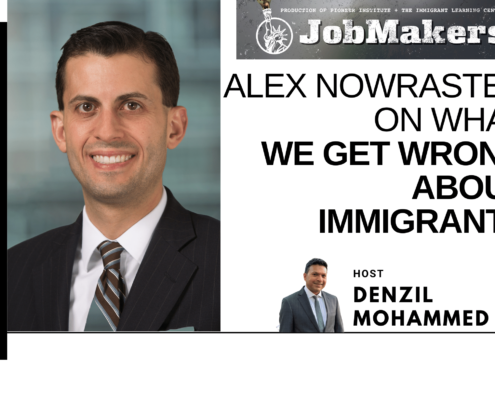
Alex Nowrasteh on What We Get Wrong About Immigrants
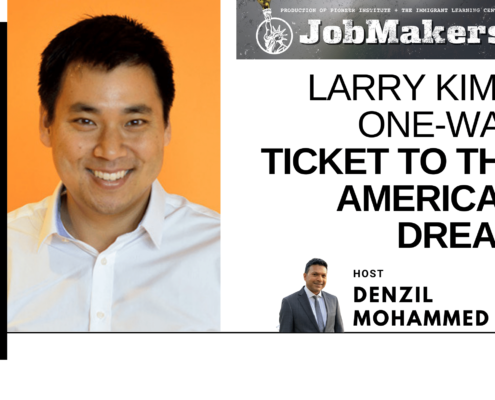
Larry Kim’s One-Way Ticket to the American Dream
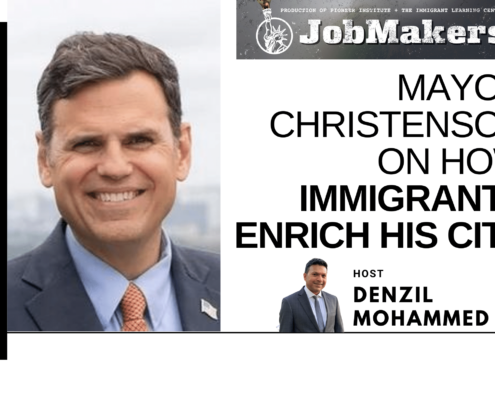
Mayor Christenson on How Immigrants Enrich His City
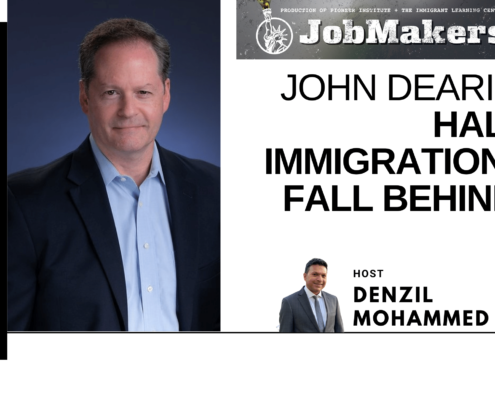
John Dearie: Halt Immigration? Fall Behind
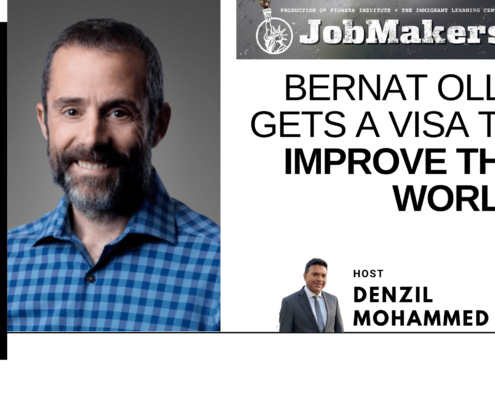
Bernat Olle Gets a Visa to Improve the World
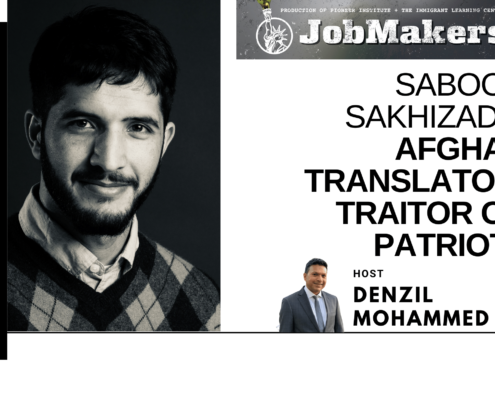
Saboor Sakhizada, Afghan Translator: Traitor or Patriot?
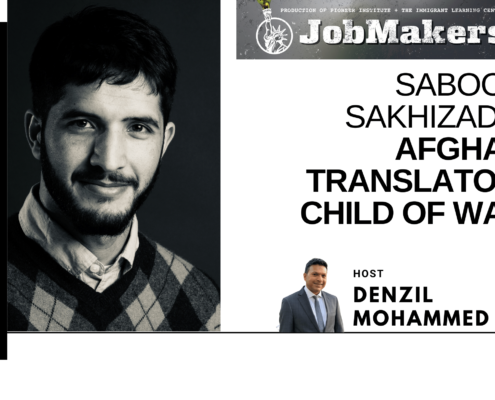
Saboor Sakhizada: Afghan Translator, Child of War
